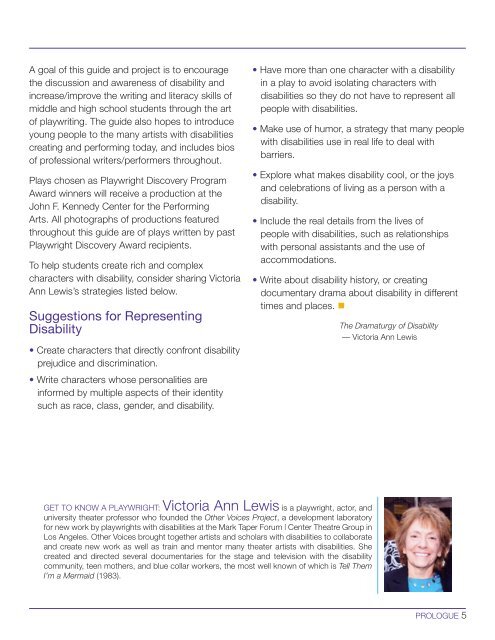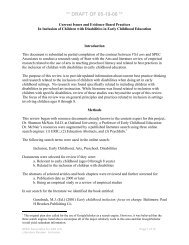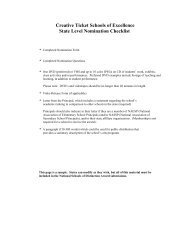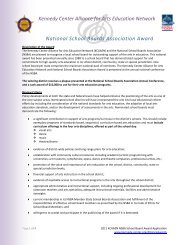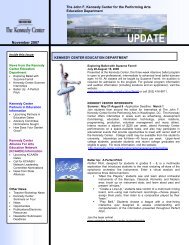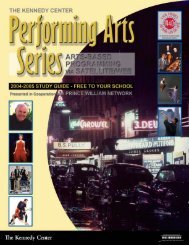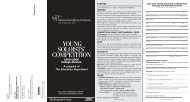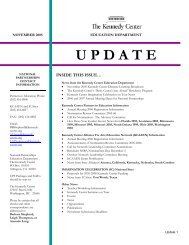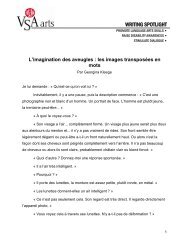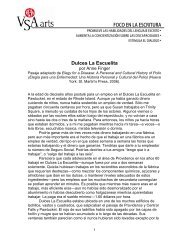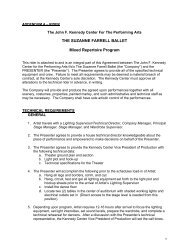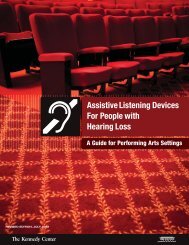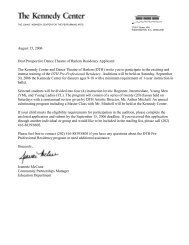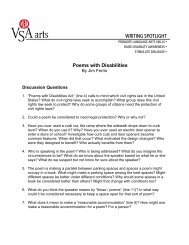Playwright Discovery Award Teacher's Guide - The John F. Kennedy ...
Playwright Discovery Award Teacher's Guide - The John F. Kennedy ...
Playwright Discovery Award Teacher's Guide - The John F. Kennedy ...
You also want an ePaper? Increase the reach of your titles
YUMPU automatically turns print PDFs into web optimized ePapers that Google loves.
A goal of this guide and project is to encourage<br />
the discussion and awareness of disability and<br />
increase/improve the writing and literacy skills of<br />
middle and high school students through the art<br />
of playwriting. <strong>The</strong> guide also hopes to introduce<br />
young people to the many artists with disabilities<br />
creating and performing today, and includes bios<br />
of professional writers/performers throughout.<br />
Plays chosen as <strong>Playwright</strong> <strong>Discovery</strong> Program<br />
<strong>Award</strong> winners will receive a production at the<br />
<strong>John</strong> F. <strong>Kennedy</strong> Center for the Performing<br />
Arts. All photographs of productions featured<br />
throughout this guide are of plays written by past<br />
<strong>Playwright</strong> <strong>Discovery</strong> <strong>Award</strong> recipients.<br />
To help students create rich and complex<br />
characters with disability, consider sharing Victoria<br />
Ann Lewis’s strategies listed below.<br />
Suggestions for Representing<br />
Disability<br />
• Create characters that directly confront disability<br />
prejudice and discrimination.<br />
• Write characters whose personalities are<br />
informed by multiple aspects of their identity<br />
such as race, class, gender, and disability.<br />
• Have more than one character with a disability<br />
in a play to avoid isolating characters with<br />
disabilities so they do not have to represent all<br />
people with disabilities.<br />
• Make use of humor, a strategy that many people<br />
with disabilities use in real life to deal with<br />
barriers.<br />
• Explore what makes disability cool, or the joys<br />
and celebrations of living as a person with a<br />
disability.<br />
• Include the real details from the lives of<br />
people with disabilities, such as relationships<br />
with personal assistants and the use of<br />
accommodations.<br />
• Write about disability history, or creating<br />
documentary drama about disability in different<br />
times and places. •<br />
<strong>The</strong> Dramaturgy of Disability<br />
— Victoria Ann Lewis<br />
GET TO KNOW A PLAYWRIGHT: Victoria Ann Lewis is a playwright, actor, and<br />
university theater professor who founded the Other Voices Project, a development laboratory<br />
for new work by playwrights with disabilities at the Mark Taper Forum | Center <strong>The</strong>atre Group in<br />
Los Angeles. Other Voices brought together artists and scholars with disabilities to collaborate<br />
and create new work as well as train and mentor many theater artists with disabilities. She<br />
created and directed several documentaries for the stage and television with the disability<br />
community, teen mothers, and blue collar workers, the most well known of which is Tell <strong>The</strong>m<br />
I’m a Mermaid (1983).<br />
PROLOGUE 5


